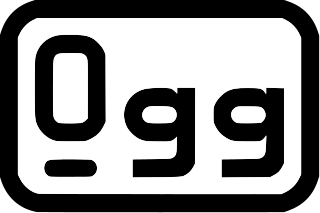Related Research Articles
An audio file format is a file format for storing digital audio data on a computer system. The bit layout of the audio data is called the audio coding format and can be uncompressed, or compressed to reduce the file size, often using lossy compression. The data can be a raw bitstream in an audio coding format, but it is usually embedded in a container format or an audio data format with defined storage layer.
A codec is a device or computer program that encodes or decodes a data stream or signal. Codec is a portmanteau of coder/decoder.
In information theory, data compression, source coding, or bit-rate reduction is the process of encoding information using fewer bits than the original representation. Any particular compression is either lossy or lossless. Lossless compression reduces bits by identifying and eliminating statistical redundancy. No information is lost in lossless compression. Lossy compression reduces bits by removing unnecessary or less important information. Typically, a device that performs data compression is referred to as an encoder, and one that performs the reversal of the process (decompression) as a decoder.

In information technology, lossy compression or irreversible compression is the class of data compression methods that uses inexact approximations and partial data discarding to represent the content. These techniques are used to reduce data size for storing, handling, and transmitting content. The different versions of the photo of the cat on this page show how higher degrees of approximation create coarser images as more details are removed. This is opposed to lossless data compression which does not degrade the data. The amount of data reduction possible using lossy compression is much higher than using lossless techniques.
Lossless compression is a class of data compression that allows the original data to be perfectly reconstructed from the compressed data with no loss of information. Lossless compression is possible because most real-world data exhibits statistical redundancy. By contrast, lossy compression permits reconstruction only of an approximation of the original data, though usually with greatly improved compression rates.

Ogg is a free, open container format maintained by the Xiph.Org Foundation. The authors of the Ogg format state that it is unrestricted by software patents and is designed to provide for efficient streaming and manipulation of high-quality digital multimedia. Its name is derived from "ogging", jargon from the computer game Netrek.
Windows Media Audio (WMA) is a series of audio codecs and their corresponding audio coding formats developed by Microsoft. It is a proprietary technology that forms part of the Windows Media framework. WMA consists of four distinct codecs. The original WMA codec, known simply as WMA, was conceived as a competitor to the popular MP3 and RealAudio codecs. WMA Pro, a newer and more advanced codec, supports multichannel and high resolution audio. A lossless codec, WMA Lossless, compresses audio data without loss of audio fidelity. WMA Voice, targeted at voice content, applies compression using a range of low bit rates. Microsoft has also developed a digital container format called Advanced Systems Format to store audio encoded by WMA.
Adaptive Transform Acoustic Coding (ATRAC) is a family of proprietary audio compression algorithms developed by Sony. MiniDisc was the first commercial product to incorporate ATRAC, in 1992. ATRAC allowed a relatively small disc like MiniDisc to have the same running time as CD while storing audio information with minimal perceptible loss in quality. Improvements to the codec in the form of ATRAC3, ATRAC3plus, and ATRAC Advanced Lossless followed in 1999, 2002, and 2006 respectively.

FLAC is an audio coding format for lossless compression of digital audio, developed by the Xiph.Org Foundation, and is also the name of the free software project producing the FLAC tools, the reference software package that includes a codec implementation. Digital audio compressed by FLAC's algorithm can typically be reduced to between 50 and 70 percent of its original size and decompresses to an identical copy of the original audio data.
Monkey's Audio is an algorithm and file format for lossless audio data compression. Lossless data compression does not discard data during the process of encoding, unlike lossy compression methods such as Advanced Audio Coding, MP3, Vorbis, and Opus. Therefore, it may be decompressed to a file that is identical to the source material.
Xiph.Org Foundation is a nonprofit organization that produces free multimedia formats and software tools. It focuses on the Ogg family of formats, the most successful of which has been Vorbis, an open and freely licensed audio format and codec designed to compete with the patented WMA, MP3 and AAC. As of 2013, development work was focused on Daala, an open and patent-free video format and codec designed to compete with VP9 and the patented High Efficiency Video Coding.
The Apple Lossless Audio Codec (ALAC), also known as Apple Lossless, or Apple Lossless Encoder (ALE), is an audio coding format, and its reference audio codec implementation, developed by Apple Inc. for lossless data compression of digital music. After initially keeping it proprietary from its inception in 2004, in late 2011 Apple made the codec available open source and royalty-free. Traditionally, Apple has referred to the codec as Apple Lossless, though more recently it has begun to use the abbreviated term ALAC when referring to the codec.
WavPack is a free and open-source lossless audio compression format and application implementing the format. It is unique in the way that it supports hybrid audio compression alongside normal compression which is similar to how FLAC works. It also supports compressing a wide variety of lossless formats, including various variants of PCM and also DSD as used in SACDs, together with its support for surround audio.
Bitrate peeling is a technique used in Ogg Vorbis audio encoded streams, wherein a stream can be encoded at one bitrate but can be served at that or any lower bitrate.
MPEG-4 Audio Lossless Coding, also known as MPEG-4 ALS, is an extension to the MPEG-4 Part 3 audio standard to allow lossless audio compression. The extension was finalized in December 2005 and published as ISO/IEC 14496-3:2005/Amd 2:2006 in 2006. The latest description of MPEG-4 ALS was published as subpart 11 of the MPEG-4 Audio standard in December 2019.

MPEG-4 SLS, or MPEG-4 Scalable to Lossless as per ISO/IEC 14496-3:2005/Amd 3:2006 (Scalable Lossless Coding), is an extension to the MPEG-4 Part 3 (MPEG-4 Audio) standard to allow lossless audio compression scalable to lossy MPEG-4 General Audio coding methods (e.g., variations of AAC). It was developed jointly by the Institute for Infocomm Research (I2R) and Fraunhofer, which commercializes its implementation of a limited subset of the standard under the name of HD-AAC. Standardization of the HD-AAC profile for MPEG-4 Audio is under development (as of September 2009).
MPEG-1 Audio Layer III HD was an audio compression codec developed by Technicolor, formerly known as Thomson.

An audio coding format is a content representation format for storage or transmission of digital audio. Examples of audio coding formats include MP3, AAC, Vorbis, FLAC, and Opus. A specific software or hardware implementation capable of audio compression and decompression to/from a specific audio coding format is called an audio codec; an example of an audio codec is LAME, which is one of several different codecs which implements encoding and decoding audio in the MP3 audio coding format in software.
References
- ↑ Martijn van Beurden. "Lossless audio codec comparison". Archived from the original on 2022-03-31. Retrieved 2022-03-14.
- ↑ "SqueezeChart 2013 Lossless Audio Compression". Archived from the original on 2013-10-05. Retrieved 2022-03-14.
- ↑ "How to use OptimFROG DualStream Correction files?". Hydrogenaudio Forums. Archived from the original on 2015-07-14. Retrieved 2015-07-13.